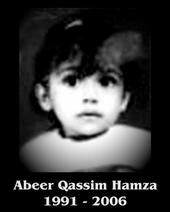"; I edited my profile at Freeweblayouts.net , check out these Myspace Layouts!
Abeer Qassim Hamza al-Janabi (August 19, 1991 – March 12, 2006) was a 14-year-old Iraqi girl who lived in the village of Mahmoudiyah southeast of Baghdad who was gang-raped, killed and burned, by American troops. Hamza, her parents and her younger sister were shot and killed in their home in Mahmoudiyah on or around March 12, 2006. A discharged U.S. serviceman, Pfc. Steven D. Green, was arrested and charged on July 3, 2006 with raping and killing Hamza and killing her father Qassim Hamza Raheem, 45, her mother Fakhriya Taha Muhasen, 34, and her seven-year-old sister, Hadeel Qassim Hamza. Initial details published by American media reported that Abeer Qassim Hamza was 25 years old, and that the others killed were her husband and child, details which were incorrect. Others reported that her parents were killed before the soldiers raped Abeer.According to one witness, Omar, a 13 year old neighbour, Abeer's father was told that there were Americans in his house. Abeer always told her mother that she was afraid of the soldiers. Her mother was sending her to stay with a neighbour, but she didn't get there in time. Qassim Hamza entered the house thereafter to "see what was happening". Omar reports to hearing a sound "like beating a tin barrel with a stick a few times", and later saw five Americans leave the house, one of whom carried two guns. Omar's mother claims that she and her son went to the neighbour's door, shouting through asking if they required assistance, but received no reply. She says she then noticed smoke coming from their window which led her to scream for help from neighbours, several of whom knocked down the door into the house. When she entered she found the remains of Abeer Qassim Hamza. "She lay there, one leg stretched and the other bended and her dress was lifted to her neck".In November, Specialist James Barker , 24, admitted rape and murder over the killings and was sentenced to 90 years. Paul Cortez broke down as he confessed to raping the girl as her parents and sister were shot dead in another room.The case is one of several in which US troops are accused of killing Iraqis.According to the plea agreement, Sgt. Cortez admitted conspiring with three other soldiers, Pfc. Steven Green, Pfc. Jesse Spielman, and Spc. Barker to rape Abeer Qassim Hamza.In court, Cortez admitted the plan was hatched as they played cards and that the girl had been targeted because there was only one male in her house, making it an easy target.He said: "During the time me and Barker were raping Abeer, I heard five or six gunshots that came from the bedroom."After Barker was done, Green came out of the bedroom and said that he had killed them all, that all of them were dead."Paul Cortez added: "Green then placed himself between Abeer's legs to rape her. When Green was finished, he stood up and shot Abeer in the head two or three times."The entire crime took about five minutes and the girl knew her parents and sister had been shot while she was being raped, the hearing heard.All five belonged to the 101st Airborne Division based at Fort Campbell, Kentucky, which is also where the hearing took place. Military investigators believe that Green and as many as four other soldiers were involved in the commission of the murders while on active duty. A criminal affidavit filed in U.S. federal court states that Green and one other participant raped Hamza and that Green killed all four individuals himself. Abeer's uncle, Ahmad, says he has "no faith" in the Court Martial, requesting that the Americans "hand the criminals to us, to an Iraqi Court. We don't trust their justice, they should be tried here in Iraq."Iraqi insurgents kidnapped two American troops whom they later killed, claiming that the killing was retaliation for Abeer's rape.Army Sgt. Paul Cortez was sentenced Thursday, February 22, 2007 to 100 years in prison for his participation in the rape and murder. Cortez, 24, also was given a dishonorable discharge. Cortez wept as he apologized for the crimes, saying he could not explain why he took part
